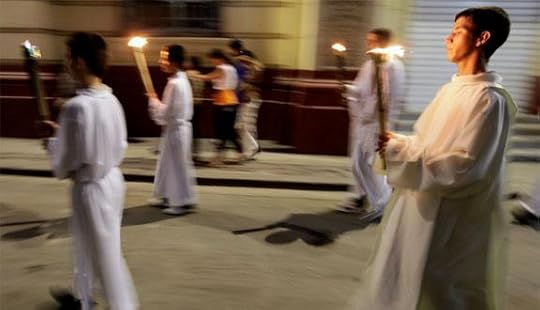Carl E. Olson's Blog, page 222
May 4, 2012
NPR and the Nuns
The NPR site has a piece, "Nuns And The Vatican: A Clash Decades In Making", that is informative in some ways, curious in others. One informative part is anecdotal and opens the piece:
When Harvard divinity professor Harvey Cox arranged to meet with Cardinal Joseph Ratzinger at the Vatican in 1988, a group of nuns thought he was wasting his time.
"I was chatting and having dinner with a number of Dominican sisters who were staying there for a 30-day retreat," Cox says. "They were incredulous that I wanted to bother seeing Ratzinger. 'Why do you want to do that?' they asked. 'Who pays any attention to him?' "
Even in 1988 there were at least two good reasons to pay attention to Cardinal Ratzinger: he was the head of the Congregation of the Doctrine of Faith and he was already rightly regarded by many as one of the finest Christian theologians of the second half of the twentieth century. But, then, you'd have to care about Church doctrine and theology to recognize those reasons.
One of the curious aspects of the piece is its heavy reliance on the experience and opinions of Cox, a liberal Protestant theologian and activist who is enamored with liberation theology. Not that Cox's opinions aren't interesting or even noteworthy, but it's a bit like having Brian Boitano explain the fundamentals of playing defensive tackle in the NFL—sure, he's an athlete, but it doesn't add up. Not surprisingly, Cox interprets the situation as one of nuns being forced to knuckle under to the faceless power brokers in the Vatican:
May 3, 2012
New: "Benedict XVI's Reform: The Liturgy Between Innovation and Tradition"
Now available from Ignatius Press:
 Benedict XVI's Reform: The Liturgy Between Innovation and Tradition
Benedict XVI's Reform: The Liturgy Between Innovation and Tradition
by Nicola Bux
When Benedict XVI reestablished the celebration of the older Latin Mass, voices of protest rose up from many sides. The widespread fear was-and is-that the Pope had revealed himself as the reactionary defender of tradition that many have accused him of being since he was the prefect of the Congregation for the Doctrine of the Faith, the former Holy Office.
Defenders of Benedict XVI have responded to these objections by explaining that the use of the Tridentine Rite is not a "step backward" to pre-Vatican II times, but rather a step forward. Now the Church can see what the older rite offered in terms of beauty, reverence, and meaning and perhaps desire more of those elements in the ordinary form of the Mass.
A professor of theology and liturgy, the author of this book explains the motives behind the Pope's decision to allow two forms of the Mass. He does this by turning to the Pope's own theological and liturgical writings, but he also draws from his experiences on various Church commissions and in offices of the Roman Curia.
The author also brings to his subject an astute understanding of current social and spiritual trends both inside and outside the Church. Sensitive to modern man's hunger for the sacred, he desires with Pope Benedict XVI that the Mass be first and foremost a place of encounter with the living God.
Nicola Bux is a priest of the Archdiocese of Bari and a professor of eastern liturgy and sacramental theology. He has studied and taught in Jerusalem and in Rome. He is a consultor to the Congregations for the Doctrine of the Faith and for the Causes of Saints and consultant of the international Catholic theological journal Communio. He was recently named a consultor to the Office of Liturgical Celebrations of the Supreme Pontiff.
The 2012 Napa Institute Conference, July 26—29, 2012
The National Catholic Register recently interviewed Tim Busch, founder of the Napa Institute:
suspect you were already active in your faith before you read Archbishop Chaput’s article. Was there ever a time when your faith played a less significant role in your life — and, if so, what was the turning point for you?
Well, I’ve always been committed to the faith. I was a cradle Catholic, and I started attending daily Mass in third or fourth grade — continuing through college to go occasionally during the week. I returned to daily Mass when I became involved in Legatus, and Legatus became the next critical step of formation for me. I’ve been involved for about 21 years now.
The idea of the Napa Institute hit me like a ton of bricks while I was vacationing in Hawaii. I felt there needed to be an intellectual Catholic apologetics conference on the West Coast. Archbishop Chaput’s article came as both an encouragement and a nucleus of thought that inspired some of the content of the conference.
Did you then further develop the conference idea with Archbishop Chaput?
Yes, and he also came up with the tagline: “Equipping Catholics in the ‘Next America.’” I also spoke to Mark Brumley, the president of Ignatius Press, about bringing a conference to Napa, where he lives. I started writing and creating this conference in August of 2010 — and we were blessed to hold our first conference at the end of July 2011.
Busch, who operates a vineyard and other businesses, was asked about how to integrate faith and business life:
Now, I’m assuming you have non-Catholic people who work for you. Do you invite them to Mass and to other religious activities — or do you feel like the presence of these things is the invitation?
The presence is the invitation. Often, when we have a Mass in the chapel for a mother or father who is sick or recently deceased, Catholics and non-Catholics both attend out of respect for their fellow employee.
The Holy Spirit does a much better job of inviting than we can, so all we need to do is celebrate our faith, and people will respond. People regularly comment to me, “Your courage in commitment to your faith has changed my life” — and I’m not even saying anything! They want the faith, and the Holy Spirit inspires the faith. Each of us, especially people like your readers, have the opportunity to push it up a notch. Don’t be afraid. It’s not going to be a negative. People aren’t going to think you’re silly. People will respect you.
The 2012 Napa Institute Conference will be held July 26 – 29, 2012 at the Meritage Resort & Spa in Napa, California. Speakers will include Archbishop Charles J. Chaput (Archbishop of Philadelphia), Fr. Robert Barron (founder of Word On Fire Catholic Ministries), and Peter Kreeft (Catholic philosopher and apologist). Other speakers and presenters include Donald Cardinal Wuerl, Bishop Robert Morlino, Dr. Tim Gray, Hugh Hewitt, Frank J. Hanna III, Fr. Joseph Fessio, Rev. Norbert Wood, O.Praem, and Elizabeth Yore.
The Conference is being sponsored this year by FOCUS, Fellowship of Catholic University Students. A PDF of the event's brochure can be downloaded from this page on the Napa Institute website.
What’s Next for Faith and Freedom in Cuba?
What’s Next for Faith and Freedom in Cuba? | Jordan Allott | Catholic World Report
Cuban opposition leaders struggle to remain hopeful despite disappointment in the wake of Pope Benedict’s visit.
For three days in late March, Pope Benedict XVI traveled across Cuba on a tightly choreographed spiritual pilgrimage. During his trip, Benedict met with government and Church officials, celebrated large public masses in Santiago de Cuba and Havana, and made statements meant to lift the spirits of the communist country’s citizens, including its six million Catholics.
I was in Cuba during the Pope’s visit, my third trip there in four years. I traveled to Cuba, in part, to learn how the Cuban people would respond to the papal visit. I also wanted to know whether Pope Benedict’s pilgrimage would contribute to lasting spiritual renewal and political change in Cuba.
I spent a lot of my time with Dr. Oscar Elias Biscet at his home in Havana. Biscet is one of Cuba’s most prominent dissident leaders and a devout Christian. Last year he was released from prison after nearly 12 years of incarceration for his human rights work. I asked Biscet about the meaning of the Pope’s visit.
“We want Pope Benedict XVI to offer his support to the poor people in Cuba, to the weak, to the rejected,” he said. “And if he does, the freedom of the Cuban people may be accomplished very soon, because this would result in many voices being raised in favor of the Cuban people and for the respect of their basic human rights.”
The Pope’s trip was dubbed by the Vatican as “pastoral in nature,” as he was celebrating the 400th anniversary of the miraculous finding of the statue of Our Lady of Charity of El Cobre. But any trip to Cuba by a head of state or religious leader involves politics.
Hundreds of Cuban opposition leaders were detained during the Pope’s visit. Others were placed under house arrest, instructed not to attend any of the Pope’s public events, or had their cell phone connections disrupted.
May 2, 2012
The Angry, Lazy Bigotry of Maureen Dowd
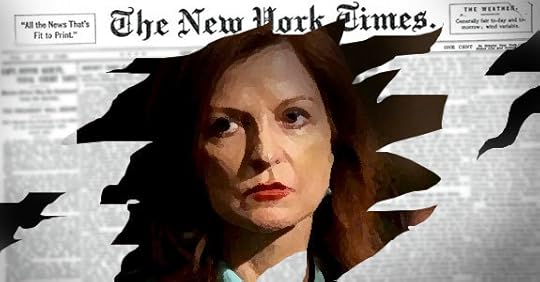
The Angry, Lazy Bigotry of Maureen Dowd | Carl E. Olson | Catholic World Report
The New York Times columnist has passed caricature and is heading for complete farce
Maureen Dowd, as most readers know, writes a regular op-ed column for the New York Times. Her dislike for certain people and institutions is quite obvious, mostly because she fixates on them in nearly every column: men, the Catholic Church (specifically, the pope, bishops, priests), Republicans (especially men who are leaders in the GOP), and men. Oh—and men.
But what Dowd seems to have a special aversion to is not male or female, nor does it belong to a political party: facts. She avoids them like she apparently avoids straight, white, conservative Catholic men—with a snarky, snarling vengeance.
Her most recent screed, disguised as a column in a classic black-and-white serif font, is titled, "Bishops Plays Church Queens as Pawns" (Apr. 28, 2012). Not surprisingly, it is filled with sneering at Catholic bishops and Church authority; it is not, however, filled with facts, documented information, or even cogent arguments. That would be too much work, I suppose, for a liberated woman such Dowd, whose has been liberated not only from men but also from the reality and appearance of actual research and thoughtful writing. Sadly, she has a loyal readership, and her particular style of lefty, drive-by op-ed writing appeals to a swath of people who are, for the most part, practitioners of a convenient and trendy bigotry. It's not just that they, like Dowd, dislike and even hate the Catholic Church, but they do so with such an audacious lack of reason and intellectual integrity that they can best be described as lazy and self-serving—the two qualities being joined at the hip, as they usually are.
With that said, let's take a look at some of the howlers, mistakes, curiosities, and falsehoods in Dowd's screed:
It is an astonishing thing that historians will look back and puzzle over, that in the 21st century, American women were such hunted creatures.
Goodness, this is a badly written sentence. Does Dowd mean to say it is astonishing that historians of the future will be historians and look back at history with the intent of examining and analyzing the historical record? Should we be astonished that historians will do their jobs in the years to come? She meant to say, of course, the following: "It is astonishing that American women are hunted creatures in 21st century—and that historians will therefore study and puzzle over this fact." But that is hardly any better, for at least two reasons.
May 1, 2012
It is time to get serious about Catholic social doctrine
Here is William McGurn, from his column in yesterday's WSJ:
Paul Ryan shocked the gentle souls at Georgetown University when he traveled up to their campus last Thursday and said: "We believe that Social Security legislation, now billed as a great victory for the poor and for the worker, is a great defeat for Christianity. It is an acceptance of the idea of force and compulsion." The Wisconsin Republican went on to lament that "we in our generation have more and more come to consider the state as bountiful Uncle Sam," and that citizens justify what they get from the state by saying, "We got it coming to us."
Sure sounds like Mr. Ryan was channeling Ayn Rand.
Except for one thing. The words are not Mr. Ryan's. They come from a 1945 column by Dorothy Day, founder of the Catholic Worker, in which she complained about how state intervention limits personal freedom and responsibility. Day's skepticism about government was reflected in her nickname for it: "Holy Mother State."
Or, in the words of Pope Benedict XVI, in his encyclical Deus Caritas Est (2005): "The State which would provide everything, absorbing everything into itself, would ultimately become a mere bureaucracy incapable of guaranteeing the very thing which the suffering person—every person—needs: namely, loving personal concern. We do not need a State which regulates and controls everything, but a State which, in accordance with the principle of subsidiarity, generously acknowledges and supports initiatives arising from the different social forces and combines spontaneity with closeness to those in need. The Church is one of those living forces: she is alive with the love enkindled by the Spirit of Christ." ...
Continue reading on the CWR blog.
Some related Ignaitus Insight links:
• Rerum Novarum and Seven Principles of Catholic Social Doctrine | Barbara Lanari
• What Is Catholic Social Teaching? | Mark Brumley
• Caritas in Veritate: "Its Principal Driving Force" | Fr. James V. Schall, S.J.
• CWR Round-Table: Caritas in Veritate | Catholic World Report
Here's why I'm happy that Dion has the blues
One of my hopes and goals for Catholic World Report is to have some regular reviews of not just books and movies, but also of good music. (Or, on occasion, of really bad music crying out to be exposed from empty note to empty note.) This post isn't a review, per se, but a short note about Dion DiMucci and his new album, A Tank Full of Blues.
Although I'm something of a music buff (50,000+ songs in my iTunes library—don't tell my wife!), I've never been much of a blues fan. And I confess, with some shame, that I only started to really listen to Dion's music a couple of years ago. But I do enjoy Dion's blues, which feature his impressively strong and clear vocals, economic and expressive guitar playing, a palpable sense of joy and gratitude, and a wry, knowing sense of humor. Some cuts, such as "Ride's Blues (for Robert Johnson)", have a more raw and gritty sound, while others, including "My Michelle", harken back a bit to Dion's blues-tinged rock music produced for Columbia in the early 1960s. In fact, the roots of Dion's interest in the blues goes back to those fifty-year-old cuts, as evidenced by the songs "Troubled Mind" and "Sweet Papa Di", as well as by the title of a collection of those cuts: Bronx Blues: The Columbia Recordings (1962-1965).
The final cut of Dion's new album is "Bronx Poem", a spoken word piece that is uniquely Dion: poignant, humorous ("Man, I've got a wife who drives me sane!"), thoughtful, and—again—joyful. It captures a man of faith who is also a musician full of life, love, and laughter. All Music Guide gives the album 4.5 stars out of five, stating:
Accompanied by his own haunting guitars and Robert Guertin's quietly shuffling drums, Dion celebrates humanity in the light of his spiritual convictions. In doing so, he comes full circle to meet himself as a street corner poet in the 1950s, and reveals his wisdom as the result of his experiences in the past and the present. He has no need to romanticize or apologize; he remains the keen-eyed, tender-hearted observer he has always been. Tank Full of Blues may be the late entry in a catalog of great work by Dion, but it stands with his best recordings. In fact, it is the album he's been waiting an entire career to make.
I recently e-mailed with author Mike Aquilina, who helped Dion write his 2011 book, The Wanderer Talks Truth and also co-wrote several cuts on A Tank Full of Blues:
The Ryan Lecture
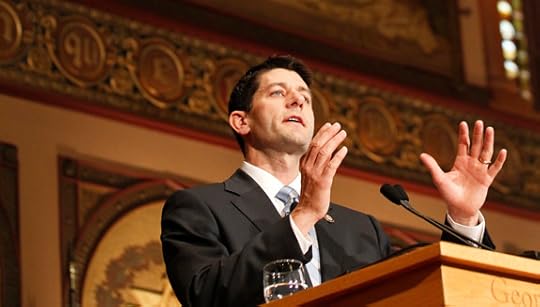
The Ryan Lecture | Fr. James V. Schall, S.J. | Catholic World Report
Solidarity, envy, and the dangers of a society that sees itself divided between rich and poor
“Look, it is rare in American politics to arrive at a moment in which the debate revolves around the fundamental nature of America democracy and the social contract. But that is exactly where we are today.”
— Congressman Paul Ryan, Whittington Lecture, Georgetown University, April 26, 2012.
I.
Plato often spoke of the dire consequences when a society becomes divided in its own mind between rich and poor. The social order becomes a war of sorts between the two factions of the same polity, each side blaming the other for the predicament of everyone. The American founders were especially concerned that this division should not arise in the new nation. This division usually represents a breakdown of any sense of common union or common good that recognizes individuals’ necessary differences in contribution, intelligence, good will, and willingness to bear burdens in the society. “Civil public dialogue goes to the heart of solidarity, the virtue that does not divide society into classes and groups but builds on the common good of all,” Paul Ryan remarked in his notable lecture at Georgetown University on April 26. We associate the term “solidarity” with John Paul II and the Polish labor movement. But Ryan’s definition of it is as good as any I have seen.
Like Plato’s specialization principle, solidarity recognizes that not everyone is the same, or wants to be, or can be. The fact that not everyone can (or wants to) do everything constitutes the foundation of the very richness of society and the meaning of the common good. This approach is the opposite of a society charged through with envy, in which any distinction of wealth or honor is taken to be unwarranted. Envy is a much more pervasive and spiritually dangerous social vice than we realize. It is almost never recognized for what it is: a refusal to admit and acknowledge what is good and worthy in others. Envy as a spiritual disorder of the soul is much more dangerous and undermining to a society than greed ever was, even though both are vices. We often call “greed” what is really envy.
The Ryan Lecture had many points that were matters of judgment. He commented on the budget, on how social thought was applied to concrete issues, on the failures of many of President Obama’s policies, on Medicare, the growing debt, and Europe’s more advanced welfare crisis. In a graphic phrase, Ryan worried that ours may well be the first generation of Americans to leave their children poorer than their parents left them. “We face a struggling economy and the probability of greater turmoil ahead.” These are sober words.
Can Beauty Save the World?
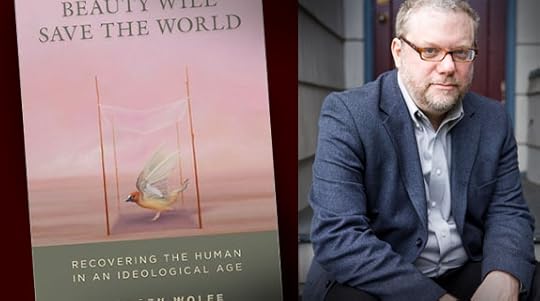
Can Beauty Save the World? | Dr. Eric Cunningham | Catholic World Report
A review of Gregory Wolfe's book, Beauty Will Save the World: Recovering the Human in an Ideological Age.
• Beauty Will Save the World: Recovering the Human in an Ideological Age. By Gregory Wolfe (Wilmington: Intercollegiate Studies Institute, 2011). 278 pages.
One Friday afternoon before Christmas break last year, a seminarian came by my office to drop off a copy of Gregory Wolfe’s Beauty Will Save the World: Recovering the Human in an Ideological Age. “You should check this out, Doc,” he said, “you and this guy think a lot alike.” It was a good day—I don’t often receive excellent books and high compliments on the same day, let alone in a single gesture.
Inspired by the lovely jacket art (a painting titled Psalm by Laura Lasworth) I set to reading immediately. I discovered, to my interest and delight, that Mr. Wolfe and I do “think a lot alike,” and seem to be of one mind concerning the debilitating effects of bad politics upon good religious culture.
I concede readily that Wolfe’s approach to the matter is a great deal more elegant and accessible than my own. Where I have long argued that the tendency of modern people to politicize every aspect of their lives, religion included, is the inevitable product of a flawed historical narrative, Wolfe argues, with convincing clarity, that “the problem” is essentially an aesthetic one, and can be remedied through a renewed appreciation, and a re-appropriation of the aesthetic sphere. As the title—borrowed from Dostoevsky by way of Solzhenitsyn—asserts, it is beauty, not ideology, that will save the world.
Like many books in the “this is just what we’ve been waiting for” category, Beauty Will Save the World is not a long-winded or multi-layered dissertation, but rather a well-articulated theme superbly reinforced and elaborated. The book is a collection of essays on aesthetics and Catholic religion, divided into five eminently readable parts.
April 30, 2012
"I don’t know Mary Eberstadt, but she writes like an angel..."
John Willson reviews Eberstadt's book, Adam and Eve After the Pill: Paradoxes of the Sexual Revolution, for the Imaginative Conservative site: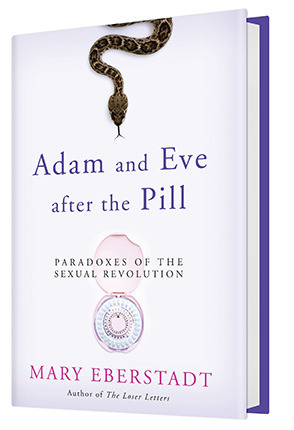
This short book, starting with a terrific chapter called “The Will to Disbelieve,” shows us that we have an almost infinite capacity to do what is wrong and call it right. Is there a connection between the Cold War and contraception/abortion? Yes.
The sexual revolution, she says with great energy, is the most important revolution of all time. It has devalued women. It has made men even dumber and more aggressive than we have always been. It has harmed our children, whom we have been put on this earth to defend, as we have been put on this earth to tend the garden.
But she says all this with grace...
Read the entire review. You can also read the Introduction to Adam and Eve After the Pill, right here on Insight Scoop.
Carl E. Olson's Blog
- Carl E. Olson's profile
- 20 followers


